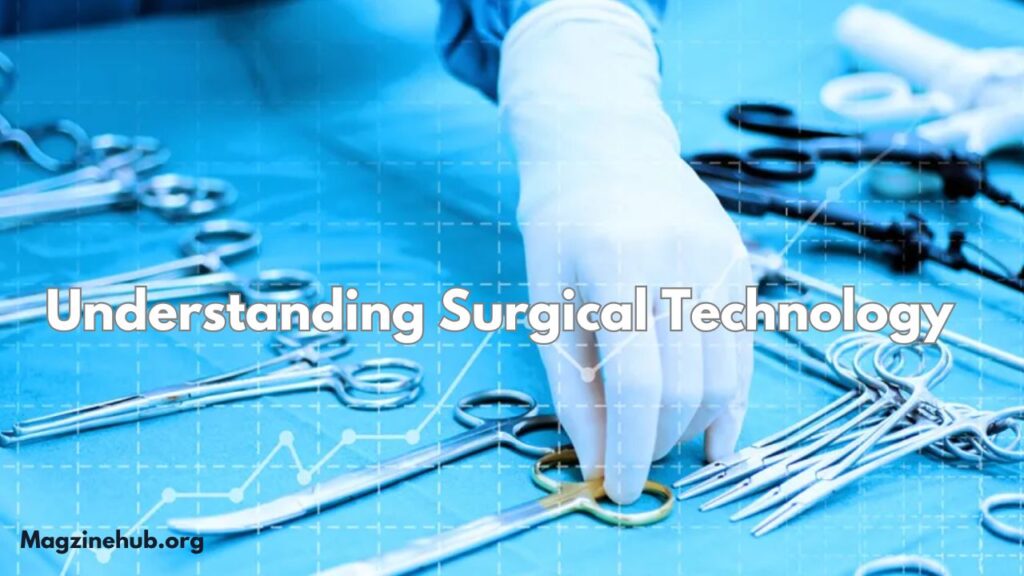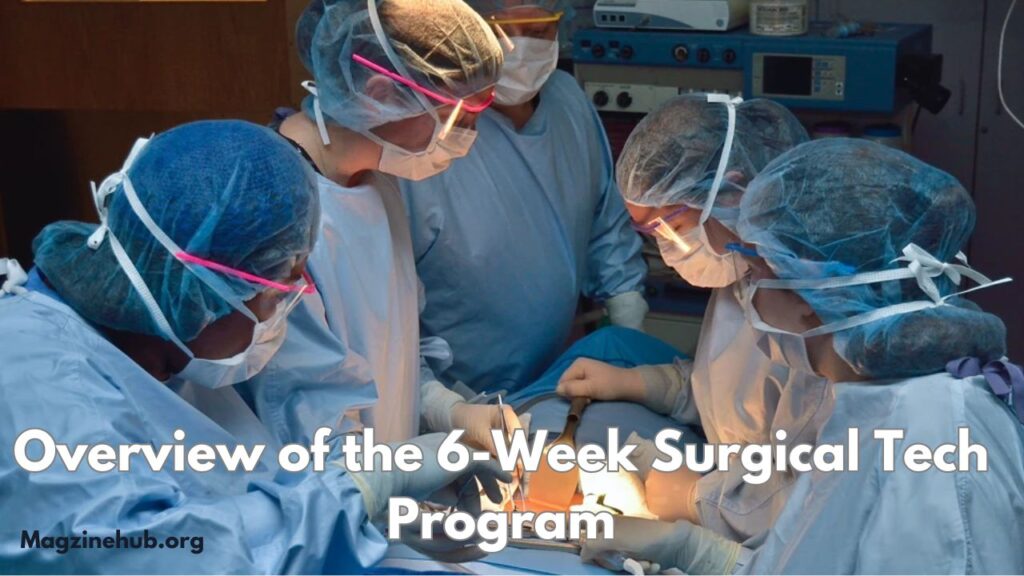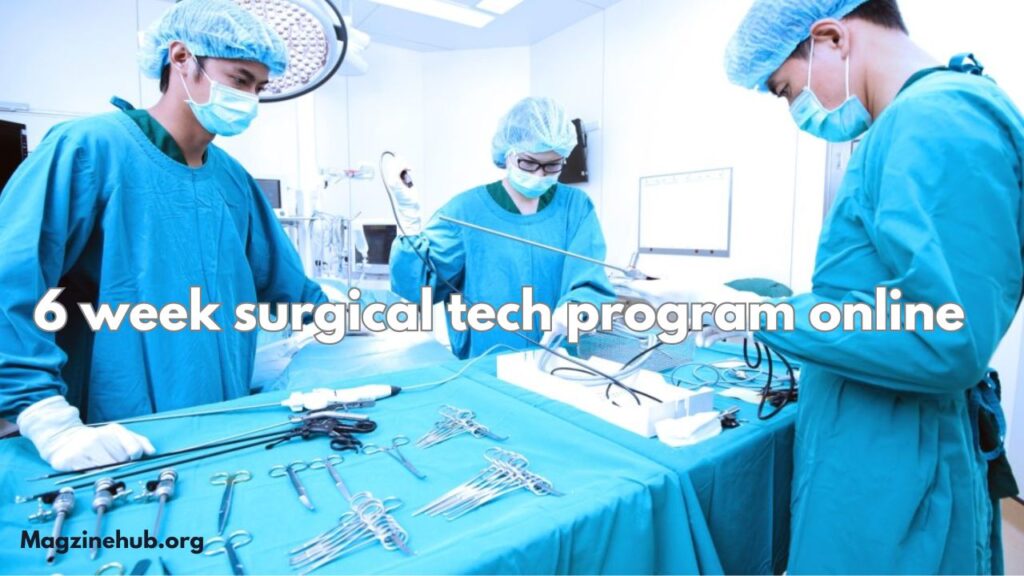Discover the benefits of a 6-week surgical tech program online. Learn about the curriculum, admission requirements, and career opportunities. Enroll now to start your healthcare career!
Table of Contents
Introduction
The healthcare industry is a dynamic and ever-evolving field that offers numerous rewarding career opportunities. One such career is that of a surgical technologist. Surgical technologists play a critical role in ensuring the success of surgical procedures, contributing significantly to patient care and safety. With the growing demand for healthcare professionals, pursuing a career as a surgical technologist has become an attractive option for many.
For those looking to enter this field quickly, the 6-week surgical tech program online offers a fast-track route to gaining the necessary skills and knowledge. This article provides an in-depth look at this accelerated program, exploring its structure, benefits, and career prospects. Whether you’re a recent high school graduate or considering a career change, this guide will help you understand the advantages of enrolling in a 6-week surgical tech program online.
Understanding Surgical Technology

Definition of Surgical Technology
Surgical technology, also known as operating room technology, involves the use of specialized skills and knowledge to assist in surgical procedures. Surgical technologists are integral members of the surgical team, working alongside surgeons, anesthesiologists, and nurses to ensure that operations are carried out smoothly and safely.
Roles and Responsibilities of a Surgical Technologist
The primary responsibilities of a surgical technologist include preparing the operating room, sterilizing instruments, and ensuring that all necessary equipment is available and functioning correctly. They also play a crucial role during surgeries by passing instruments to the surgeon, maintaining sterile conditions, and assisting with suturing and dressing wounds.
Importance of Surgical Technologists in Healthcare

Contribution to Surgical Teams
Surgical technologists are vital to the efficiency and success of surgical teams. Their meticulous preparation and attention to detail help prevent infections and complications, ensuring that surgeries are performed under optimal conditions. By managing surgical instruments and supplies, they allow surgeons and other medical professionals to focus on the procedure itself.
Enhancing Patient Safety and Care
Patient safety is a top priority in any surgical procedure. Surgical technologists help maintain a sterile environment, reducing the risk of postoperative infections. Their expertise in handling surgical instruments and equipment also ensures that surgeries are performed with precision and care, ultimately improving patient outcomes.
Overview of the 6-Week Surgical Tech Program

Curriculum and Course Structure
The 6-week surgical tech program online is designed to provide a comprehensive education in surgical technology within a short timeframe. The curriculum covers essential topics such as anatomy and physiology, surgical procedures, sterilization techniques, and patient care. The program is divided into weekly modules, each focusing on specific aspects of surgical technology.
Key Learning Objectives
The main objectives of the 6-week surgical tech program are to equip students with the theoretical knowledge and practical skills needed to excel as surgical technologists. By the end of the program, students will be proficient in preparing operating rooms, assisting during surgeries, and providing postoperative care.
Accreditation and Certification
Accreditation is an important factor to consider when choosing a surgical tech program. Accredited programs meet established standards of quality and are recognized by professional organizations. Completing an accredited 6-week surgical tech program online can help you become eligible for certification exams, such as those offered by the National Board of Surgical Technology and Surgical Assisting (NBSTSA).
Detailed Course Breakdown
Week 1: Introduction to Surgical Technology
The first week of the program introduces students to the field of surgical technology. Topics covered include the history of surgical technology, the roles and responsibilities of surgical technologists, and basic medical terminology. Students also learn about the ethical and legal considerations in surgical practice.
Week 2: Anatomy and Physiology for Surgical Technologists
Understanding human anatomy and physiology is crucial for surgical technologists. During the second week, students study the major body systems, including the cardiovascular, respiratory, and musculoskeletal systems. They also learn about surgical anatomy and the physiological processes relevant to surgical procedures.
Week 3: Surgical Instruments and Sterilization Techniques
The third week focuses on the identification and use of surgical instruments. Students learn about the different types of instruments used in various surgical procedures and how to handle them properly. This module also covers sterilization techniques, including methods for cleaning, disinfecting, and maintaining surgical instruments.
Week 4: Preoperative Procedures
In the fourth week, students learn about the essential tasks that need to be completed before surgery. This includes preparing the operating room, setting up surgical instruments, and ensuring that all necessary supplies are available. Students also study patient preparation procedures, such as positioning and draping techniques.
Week 5: Intraoperative Procedures
The fifth week covers the responsibilities of surgical technologists during surgery. Students learn how to assist the surgical team by passing instruments, maintaining sterile fields, and managing surgical supplies. This module also includes training on monitoring patients’ vital signs and responding to any emergencies that may arise during the procedure.
Week 6: Postoperative Procedures and Patient Care
The final week of the program focuses on postoperative care. Students learn about the procedures for cleaning and sterilizing surgical instruments after surgery, as well as how to document and report surgical outcomes. They also study patient care techniques, including wound dressing and postoperative monitoring.
Benefits of an Online Program
Flexibility and Convenience
One of the primary advantages of an online surgical tech program is the flexibility it offers. Students can access course materials and complete assignments at their own pace, making it easier to balance their studies with other commitments, such as work or family responsibilities. Online programs also eliminate the need for commuting, saving time and reducing stress.
Interactive Learning Tools and Resources
Online surgical tech programs often incorporate a variety of interactive learning tools, such as virtual simulations, video demonstrations, and discussion forums. These resources enhance the learning experience by providing students with practical, hands-on training in a virtual environment. Additionally, online programs may offer access to digital libraries and research databases, further supporting students’ education.
Support from Instructors and Peers
Despite the physical distance, online programs foster a sense of community among students and instructors. Many programs offer virtual office hours, discussion boards, and group projects, allowing students to interact with their peers and receive guidance from their instructors. This support network is essential for maintaining motivation and ensuring academic success.
Admission Requirements
Educational Prerequisites
To enroll in a 6-week surgical tech program online, applicants typically need a high school diploma or equivalent. Some programs may also require prerequisite coursework in subjects such as biology, chemistry, or medical terminology. It’s important to check the specific admission requirements for the program you’re interested in.
Application Process
The application process for an online surgical tech program usually involves submitting an application form, academic transcripts, and possibly a personal statement or letters of recommendation. Some programs may also require an interview to assess the applicant’s suitability for the program. It’s important to complete all application requirements thoroughly and accurately to increase your chances of acceptance.
Financial Aid and Scholarships
Financial aid and scholarships can help make an online surgical tech program more affordable. Many programs offer financial assistance options, including federal and state grants, student loans, and institutional scholarships. Be sure to research and apply for financial aid early to secure the funding you need to complete the program.
Skills Acquired in the Program
Technical Skills
Students in a 6-week surgical tech program acquire a range of technical skills essential for their role. These include the proper use and maintenance of surgical instruments, techniques for sterilization and disinfection, and the ability to assist during surgical procedures. Additionally, students learn how to operate medical equipment and monitor patients’ vital signs.
Soft Skills
In addition to technical skills, surgical technologists must possess strong soft skills. Effective communication, teamwork, and problem-solving abilities are crucial in the high-pressure environment of an operating room. The program helps students develop these skills through collaborative projects, simulations, and practical exercises.
Professional Development
The 6-week surgical tech program also emphasizes professional development. Students learn about the ethical and legal aspects of surgical practice, as well as the importance of continuing education and lifelong learning. By the end of the program, graduates are well-prepared to pursue certification and advance their careers in surgical technology.
Certification and Career Advancement
Certification Process
Certification is an important step for surgical technologists, as it demonstrates their competence and commitment to the profession. Upon completing the 6-week surgical tech program, graduates can pursue certification through organizations such as the National Board of Surgical Technology and Surgical Assisting (NBSTSA). The certification process typically involves passing an exam that tests the knowledge and skills acquired during the program.
Career Opportunities and Job Outlook
The demand for surgical technologists is expected to grow in the coming years, driven by an aging population and advances in medical technology. Career opportunities are available in various healthcare settings, including hospitals, outpatient centers, and specialty clinics. Surgical technologists can also specialize in specific areas, such as cardiovascular or orthopedic surgery, to enhance their career prospects and earning potential.
Continuing Education and Specialization
Continuing education is essential for surgical technologists who want to stay current with the latest advancements in the field. Many professional organizations offer workshops, conferences, and online courses to help technologists maintain their certification and expand their knowledge. Specializing in a particular area of surgery can also open up new career opportunities and lead to higher salaries.
Student Testimonials
Success Stories
Many students who have completed the 6-week surgical tech program online have successfully transitioned into rewarding careers in healthcare. Their success stories highlight the program’s effectiveness in providing the necessary skills and knowledge for the job. Graduates often praise the comprehensive curriculum and the support they received from instructors and peers.
Experiences of Online Learning
Online learning offers unique advantages, such as flexibility and accessibility. Students appreciate the ability to study at their own pace and access course materials from anywhere with an internet connection. The interactive learning tools and virtual simulations also enhance their understanding of surgical procedures and techniques.
Impact on Career Progression
Graduates of the 6-week surgical tech program often report significant career progression after completing the program. Many have secured positions in reputable healthcare facilities and have advanced to higher roles through continuing education and specialization. The program’s focus on professional development and certification preparation has been instrumental in their career success.
Expert Insights
Quotes from Healthcare Professionals
Healthcare professionals emphasize the critical role of surgical technologists in ensuring patient safety and the smooth operation of surgical procedures. According to Dr. Jane Smith, a renowned surgeon, “Surgical technologists are the backbone of the operating room. Their expertise and attention to detail are crucial for the success of any surgery.”
Advice for Aspiring Surgical Technologists
Experts advise aspiring surgical technologists to stay committed to their education and continuously seek learning opportunities. “The field of surgical technology is constantly evolving,” says John Doe, a certified surgical technologist. “Staying updated with the latest advancements and best practices is essential for long-term success.”
Common Challenges and Solutions
Balancing Study and Work
Balancing study and work can be challenging for online students. Effective time management and setting a structured study schedule can help manage this issue. Prioritizing tasks and setting realistic goals can also make it easier to stay on track.
Overcoming Technical Difficulties
Technical difficulties are common in online learning environments. Ensuring that you have a reliable internet connection and up-to-date software can help minimize disruptions. Many programs also offer technical support to assist students with any issues they may encounter.
Staying Motivated
Maintaining motivation can be difficult, especially when studying online. Setting clear goals, staying organized, and connecting with peers can help keep you motivated. Regularly reviewing your progress and celebrating your achievements can also boost your motivation.
Future Prospects of Surgical Technology
Advancements in Surgical Technology
The field of surgical technology is rapidly evolving, with advancements in minimally invasive surgeries, robotic-assisted procedures, and enhanced sterilization techniques. These innovations promise exciting opportunities for surgical technologists, making it a promising career choice with substantial growth potential.
Emerging Trends and Innovations
Emerging trends in surgical technology include the use of augmented reality (AR) and virtual reality (VR) in surgical training, the development of new surgical instruments, and the integration of artificial intelligence (AI) in surgical planning and decision-making. Staying updated with these trends can enhance your skills and career prospects.
Long-Term Career Growth
The demand for skilled surgical technologists is expected to continue growing, providing long-term career stability and growth. With the right education and certification, you can advance to higher roles, such as surgical first assistant or surgical technology instructor. Continuing education and specialization can also lead to increased earning potential and job satisfaction.
FAQs
What is a surgical technologist? A surgical technologist is a healthcare professional who assists in surgical operations, ensuring that procedures are conducted safely and efficiently. They prepare operating rooms, sterilize instruments, and assist surgeons during surgeries.
How long does it take to become a surgical technologist? The duration can vary, but the 6-week surgical tech program online is an accelerated option designed to quickly prepare students for the field. Traditional programs may take several months to a year to complete.
What are the admission requirements for the program? Typically, a high school diploma or equivalent is required, along with an application process that may include an interview. Some programs may also require prerequisite coursework in subjects such as biology or medical terminology.
Is financial aid available? Yes, financial aid and scholarships are often available to help cover the costs of the program. It’s important to research and apply for financial aid early to secure the funding you need.
What kind of support can I expect from instructors? Students can expect robust support through virtual office hours, discussion boards, and direct communication with instructors. Many programs also offer peer support networks and technical assistance.
What is the job outlook for surgical technologists? The job outlook is positive, with increasing demand for skilled surgical technologists in various healthcare settings. Career opportunities are available in hospitals, outpatient centers, and specialty clinics.
Conclusion
The 6-week surgical tech program online offers a fast-track route to a fulfilling career in healthcare. With its comprehensive curriculum, flexibility, and support, it equips students with the necessary skills to excel as surgical technologists. If you’re looking to make a meaningful impact in the medical field, consider enrolling in this program and take the first step toward a rewarding career.
